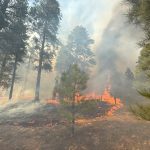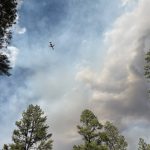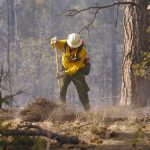
Diné voters still face challenges
WINDOW ROCK
Navajo voting rights have come a long way since 2017, when a federal judge ordered San Juan County, Utah, to redraw its voting districts to ensure representation of the county’s Native American majority. But there are still a number of obstacles preventing Diné from being fully franchised, said Leonard Gorman, executive director of the Navajo Nation Human Rights Commission.
First, of course, is the bugaboo of the year — the coronavirus. Navajos usually enjoy going to the polls, meeting old friends and getting a free bowl of mutton stew from one of the candidates on their way out. But this year, rubbing shoulders could be a death sentence, and Gorman is afraid Diné voters will opt out.
There’s mail-in voting, of course. But that presents a whole other set of problems. With few actual post offices on the reservation, many people turn to their local convenience store to send and pick up mail. The problem with that, Gorman said, is that the small post offices inside the stores aren’t government-sanctioned and they don’t have an official state stamp for incoming mail. “The government requires the ballot to be stamped by the business day before the election,” Gorman observed.
A letter from Tonalea, Arizona, to Monticello, Utah, for example, will go to Phoenix and Salt Lake City before arriving in Monticello. If it’s stamped in Phoenix or Salt Lake, that may be several days after it was mailed, and if the voter has cut the deadline a little too close, his ballot may be invalidated. The convenience store post offices also are not regularly staffed.
Other than that, there’s in-person early voting, but early voting locations are also few and far between on the Navajo Nation. “We’re in discussions with the three Arizona counties and San Juan County to provide more early voting locations,” Gorman said.
Of course, access to the polls will do you no good if you don’t speak English well and can’t read the ballot. In that case, counties are supposed to provide a translator, Gorman said. But the Human Rights Commission has heard a lot of complaints about the quality of translation.
“Just because someone speaks Navajo and English doesn’t mean they’re a good translator,” Gorman explained. “It’s a skill. And just like medicine or the courts, elections have their own vocabulary.” To try to solve this problem, the HRC worked with Navajo Technical University last year to develop a curriculum for election translators.
“We were hopeful this training would have yielded its first graduates by now,” Gorman said, “but of course COVID decided to interfere. We’re hopeful by next month enough people will have completed the training to start staffing some of those positions.”
Gorman also wishes the states would be more clear in the ballot instructions. “There’s some misleading wording,” he said. “It says, ‘Make sure to sign your ballot.’ But you don’t sign your ballot. You sign the envelope. If you take them literally and sign your actual ballot, it will be invalidated.”
Is the lack of accommodation for Navajos inadvertent or, as it seemed in San Juan County, an attempt to disenfranchise people of color? “It’s not overt,” Gorman said, “but some of the things we hear make us wonder. For instance, a county official will tell you they can’t adjust the precinct boundaries.
That’s not true.” In spite of all the obstacles they face, Navajos are determined voters. About 70 percent of the voting-age population casts their ballot in presidential elections; close to 60 percent in off years. That’s compared to 58 percent and 40 percent, respectively, for Americans as a whole.
The Human Rights Commission is hoping to raise those figures even more by clearing the obstacles and encouraging Diné to make their voices heard, as they did by electing a majority-Navajo San Juan County Commission in 2018. Gorman assured that although the HRC office is closed, staff is working remotely and monitoring this election season closely. Because voting rights are fragile.
“We’ve come a long way, but you never know,” he said. “With every change in the political winds you have to be cognizant of the effect on voter rights. All the changes we made could easily be swept away.”








 Highway 264,
Highway 264, I-40, WB @ Winslow
I-40, WB @ Winslow